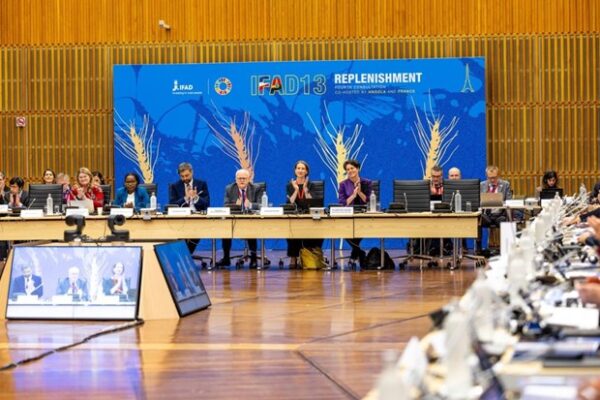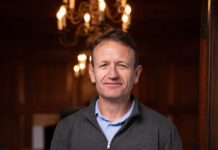At a time when climate change and conflict are fuelling greater food insecurity in many developing countries, the International Fund for Agricultural Development (IFAD) received record-breaking pledges in support of its largest replenishment ever, putting the organization on track to positively impact the lives of millions of rural people across the globe.
Many of the pledges were made during a fourth replenishment session hosted in Paris over the last two days by Angola and France.
To date 48 Member States have pledged US$1.076 billion to replenish its core resources. Ten countries have increased by more than 50% from their previous contribution, and 31 countries have committed to their highest contribution ever, marking a record level of financing achieved for IFAD’s 2025-2027 programme of work.
“This is a clear sign of the confidence Member States have in IFAD, and the importance they place on our ability to deliver results and impact through targeted investments that transform agriculture, rural economies and food systems,” said Alvaro Lario, President of IFAD, following the pledging session in Paris. “They understand that investing in rural people and small-scale producers, who produce one third of the world’s food and up to 70% of the food in low and middle-income countries, is the only path to a food secure future.”
IFAD launched its 13th replenishment in February 2023, calling for increased investments in small-scale farmers and rural people across developing countries. IFAD’s resources are replenished every three years by Member States. The consultation culminated in a pledging session in Paris. Fundraising will then continue during 2024. Typically, over 100 countries contribute to IFAD’s replenishments, making it the most widely supported of all the major IFI replenishments.
“I am humbled by the positive momentum from today’s session and confident that IFAD’s ambitious call to mobilize US$2 billion in new funding to support a US$10 billion programme of work and impacting over 100 million rural people will be achieved in the coming months,” said Lario.
IFAD’s Member States have demonstrated their record-breaking support and IFAD’s pivotal role in revitalizing the 2030 Agenda of Sustainable Development Goals through investing in rural people.
“We rely on IFAD to ensure the resilience we seek to build, taking into account climate change and all other factors that hinder our development,” said Carmen do Sacramento Neto, Minister of Fisheries and Marine Resources, Angola, at the opening of the session. “There has been an improvement in the living conditions of rural and fishing populations where the IFAD project [was implemented] and it has had a significant impact. We announce that Angola will maintain its contribution and increase it in the coming years as a clear sign of our commitment.”
“Developing countries don’t need external support, but agricultural and food independence. This is where IFAD must play a key role in reversing the trend. IFAD is a decisive player. It enables the development of the most vulnerable countries, and above all it supports what is at the heart of our ambition: structural transformations in agriculture,” said Bruno Le Maire, Minister of Economy, Finance and Industrial and Digital Sovereignty, France, at the high-level session. “You can count on our commitment, and you can count on our determination to make a lasting difference.”
“By stepping up for IFAD13, the global community has a priceless opportunity to turn the tide on poverty and hunger. Rural people are the best investment we can make in a sustainable future, and IFAD, no surprise, is best placed to make this happen,” said Sabrina Elba, IFAD Goodwill Ambassador addressing Member States at the pledging session.
Collaborating with Member States, IFAD invests in rural development and across food systems to help small-scale farmers produce more food and in greater variety, access markets, apply new technologies and adapt to climate change. IFAD ensures that Member State contributions reach those who need it the most, with 45% in total concessional financing going to low-income countries and at least 30% of core resources dedicated to fragile situations.
IFAD’s work achieves measurable impact. Between 2019 – 2021, IFAD’s investments improved the incomes of 77.4 million rural people, while 62 million rural people increased their production, and 64 million rural people improved their access to markets, enabling them to sell their production. In addition, IFAD helped 38 million people bolster their resilience, as measured by their ability to recover from climatic and non-climatic shocks, thanks to improved agricultural practices, access to technical assistance and credit, as well as the diversification of their income sources.
“Today, IFAD Member States have collectively sent a bold message to the world on the strategic importance to invest in rural populations, to ensure food security, to end rural poverty and to act on climate adaptation, building a more stable world for us all,” said President Lario.








